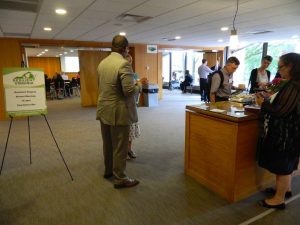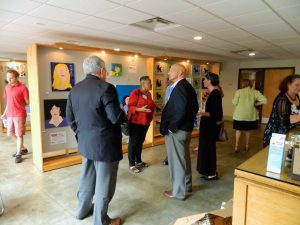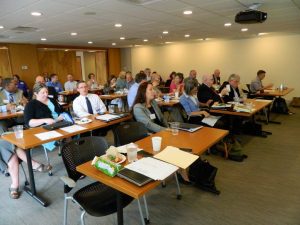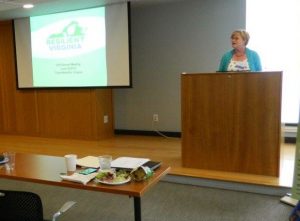By Allison Meade, Resilient Virginia Intern and Annette Osso, Managing Director, Resilient Virginia
On Thursday, June 30, Resilient Virginia held its 2016 Annual Meeting in Charlottesville, Virginia. Resilient Virginia took the opportunity to highlight year two accomplishments, including the first statewide Resilient Virginia Conference, and to introduce the new Board of Directors.
The meeting hosted three guest speakers and also provided a presentation on the newly developed Resiliency Checklist for Local Governments. Our guest speakers were: Angela Navarro, the Deputy Secretary of Natural Resources; Terence Hill, a Senior Policy Advisor at EMerge Alliance; and Adrianna Vargo, the Director of Grower Services at Local Food Hub. Each took time to present on resiliency progress in their areas of work.
Angela Navarro spoke about the June 28 news release by Governor McAuliffe on the signing of Executive Order 57 to reduce carbon emissions in the state. The order directs the creation of a workgroup and steps to take towards reducing carbon pollution from the state electricity sector in order to meet the requirements of the Clean Power Plan. The news release on the signing of the order can be found at the Governor’s newsroom page.
Terence Hill followed Navarro with a short presentation on the resilient design attributes of direct current, microgrids, and transactive energy systems. Hill’s presentation on the technology involved, design options, and their impacts can be found here. Adrianna Vargo was the third guest presenter, speaking about the LocalFoodHub and their efforts in local Virginia communities. She focused on the connection of local farms to regional markets and the positive impact this has on both the farmers and consumers of the local food. Her presentation and website with details on the scope of business are provided.
Following the guest speakers, Annette Osso, Managing Director of Resilient Virginia. gave a presentation on the 2016 version of the Virginia Municipal League and Virginia Association of Counties Go Green Virginia checklist. New this year is the Resiliency Checklist section of the GoGreen Government Challenge. The Resiliency Checklist, developed by Resilient Virginia Board members and other colleagues, provides a roadmap for localities to use when assessing the state of their resiliency preparedness, finding the gaps, and planning ahead.
The checklist provides a spirited point system meant to encourage actions to reduce carbon emissions within the local government and wider community, and find out more about the GoGreen Government Challenge here. It encompasses 11 areas for action including community involvement, resiliency, energy efficiency, renewable energy, procurement, land use and transportation, environmental stewardship, water quality supply and flooding, waste management, employee incentives, and innovation.
For the last portion of the meeting, attendees were invited to give short presentations on their work with resiliency. Notable presentations included: Travorise Marks, Resilience Program Manager, from the Virginia Department of Emergency Management, who spoke on emergency preparedness within the state; Joanie Freeman of Eco-Village Charlottesville, who spoke on the progress of that initiative; Vince Meldrum from Earth Force who spoke about youth involvement in stormwater management; Joyce Bodoh from the Rappahannock Electric Cooperative who spoke on the utility’s energy efficiency initiatives, and Jim Pierobon with Southeast Energy News who spoke about ongoing coverage of clean energy and conventional energy topics in the Southeastern United States. The overarching themes of mitigation and adaptation were developed and reflected on by all who participated.
Finally, Nell Boyle, the newly elected Chair of the Board of Directors, encouraged people to become involved in planning committees for upcoming programs, such as a webinar series and the 2017 Resilient Virginia Conference. She encouraged support for our statewide resiliency initiatives by becoming a member or annual sponsor of Resilient Virginia.





 Click to launch slideshow
Click to launch slideshow Click to launch slideshow
Click to launch slideshow Click to launch slideshow
Click to launch slideshow


